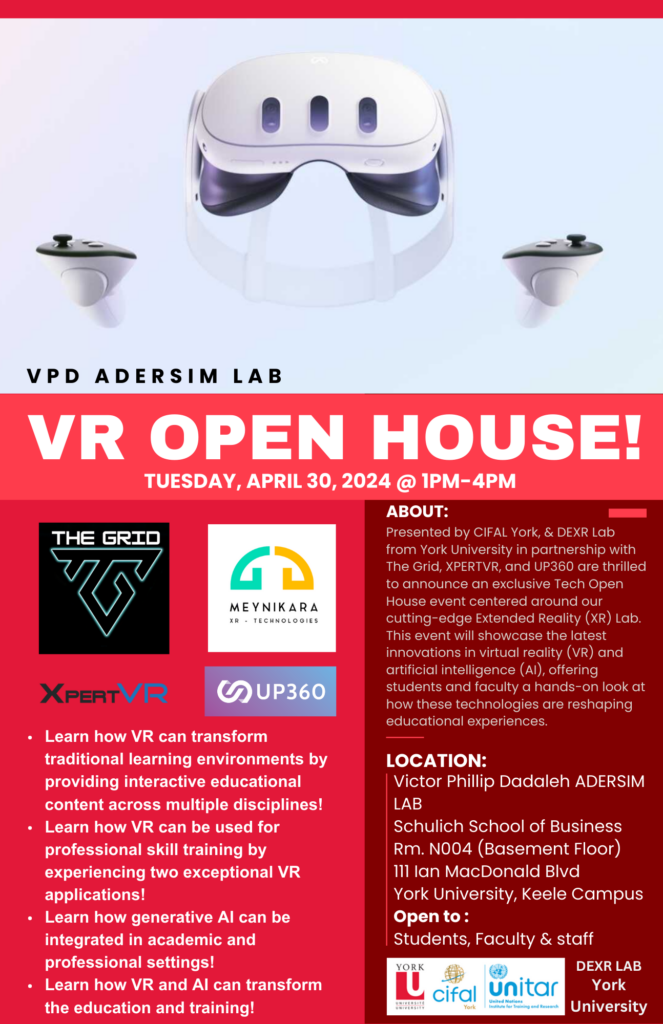Give back to the game.

Our Inaugural VR Open House
Date: Tuesday April 30, 2023
Time: 1:00-4:00 PM
Location: Dadaleh ADERSIM Lab, Room N004 Schulich Building, York University, 4700 Keele Street, Toronto, Ontario, Canada
About the open house
Virtual Reality (VR) technologies are reaching to their maturity levels. Increasingly more institutions are leveraging these technologies in their daily operations particularly for education, training. VR is transforming education and training through its ability by enabling users to engage with complex subjects through interactive 3D visualization. VR is used for design and development of processes, products, and functions in low cost and low risk environments. Use of VR is being expanded in the healthcare and rehabilitation services. VR is also changing the gaming and entertainment industry for better health outcomes by enabling more physical and mental activities for the users. This VR Open House aims to create an environment where students, researchers and the public can openly experience, explore, and discuss VR technology and its applications can contribute to VR capacity building.
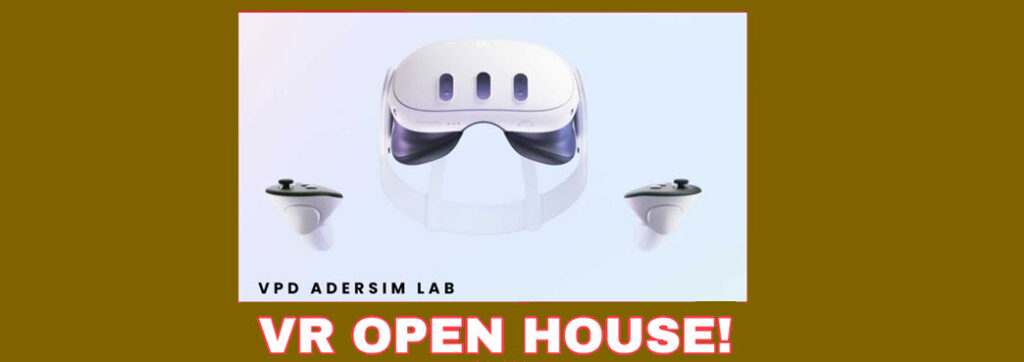
Learning objectives
After joining this open house learning event participants will:
- Learn about different VR/AR devices that are commonly used.
- Hands on test and experiment with some of the exciting VR applications using VR headsets.
- Understand the use of VR in different sectors and domains.
- Examine how VR is used for entertainment., healthcare, public safety, and professional development.
- Network with VR researchers, practitioners, developers, entrepreneurs, and users.
- Learn how VR can help changing the world to a better place.
- Understand how VR applications are developed.
Target Audience
- Undergraduate, master & PhD students
- Faculty members and researchers
- Staff
- Professionals and practitioners interested in learning about VR technology
- VR industry organizations
- Workshop Presentations
Our Inaugural VR Open house
Date: Tuesday April 30, 2023
Time: 1:00-4:00 PM
Location: Dadaleh ADERSIM Lab, Room N004 Schulich Building, York University, 4700 Keele Street, Toronto, Ontario, Canada
Partner VR Companies, Initiatives, Labs & Projects

DEXR LAB & ADERSIM, York University
Hosted by DEXR Labs, the XR Lab event is more than just a demonstration of technology—it's a step towards a more interactive and engaging future for York University. DEXR Labs will highlight how these technologies can be continuously accessed and utilized by both students and faculty to enhance educational outcomes and foster innovation on campus.
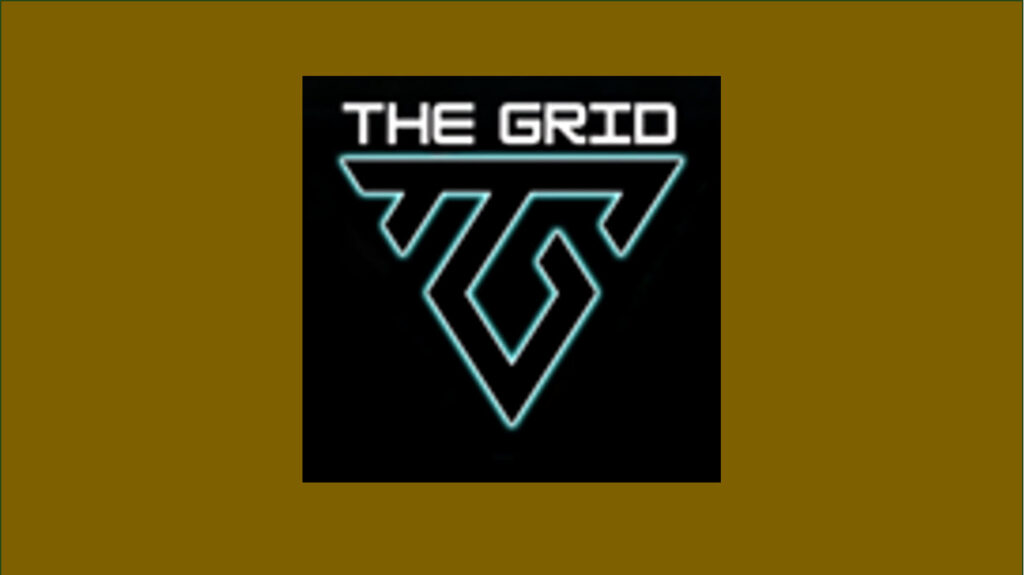
The GRID
Prepare to be immersed in a variety of VR experiences designed to educate, engage, and entertain. The Grid will demonstrate how VR can transform traditional learning environments by providing interactive educational content across multiple disciplines. From exploring historical sites in stunning detail to conducting complex scientific experiments in a controlled virtual space, the possibilities are limitless. Beyond VR, the event will introduce participants to the basics of AI integration in academic and professional settings. The Grid will provide insights into how AI can be harnessed to personalize learning, automate tasks, and analyze data effectively, preparing students and faculty to leverage AI technologies for research and problem-solving.
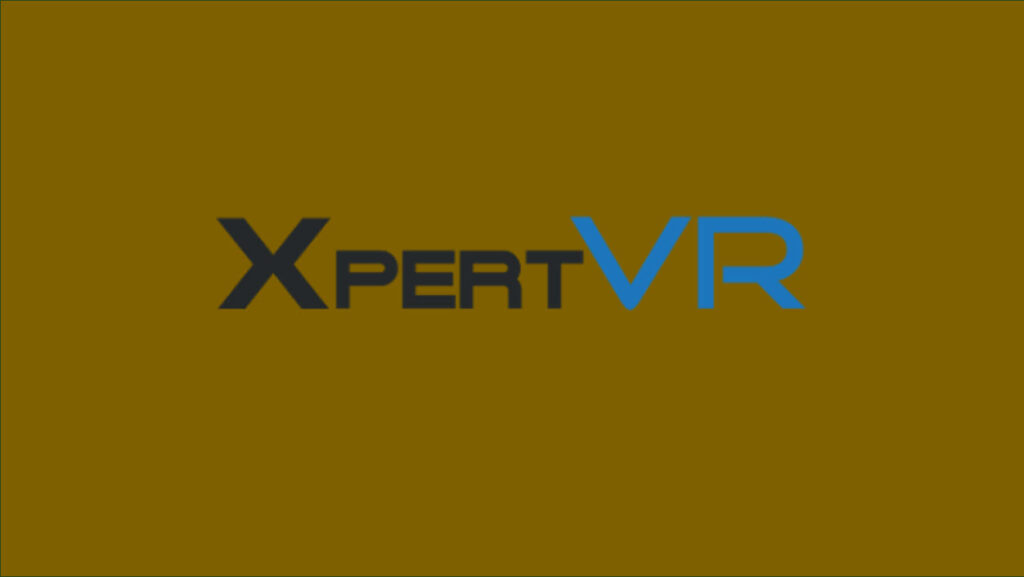
ExpertVR
Firefighter Training by Xpert VR Experience the adrenaline and demands of firefighting in a completely safe yet incredibly realistic environment. This VR training simulates various emergency scenarios, teaching participants how to handle intense, high-stress situations with precision and confidence.
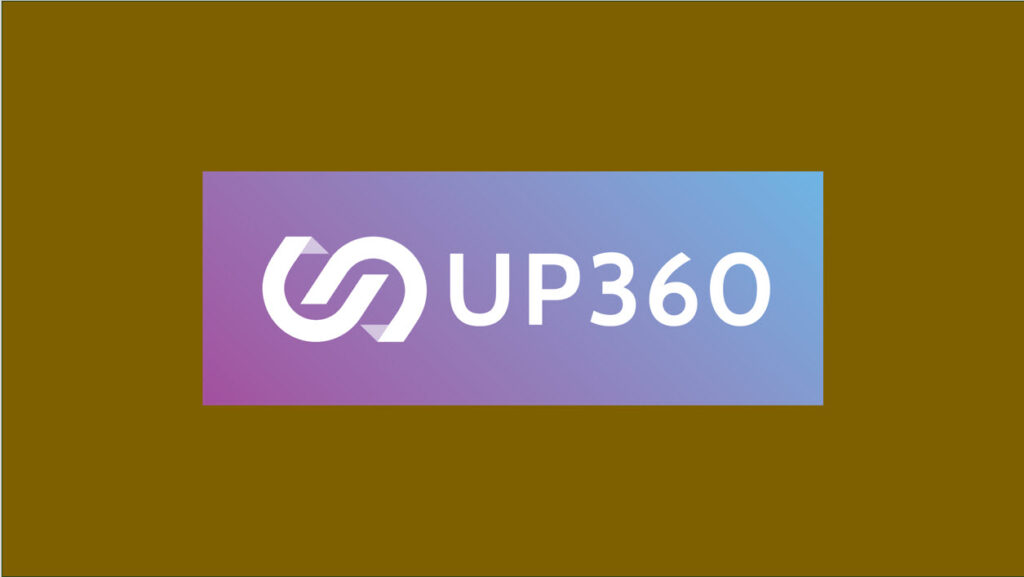
Up360
Job Training by Up360: Prepare for the workforce with Up360’s job training VR modules. These sessions are designed to equip students with practical skills in a range of industries, from construction to healthcare, through immersive, hands-on virtual training.

Meynikara
Meynikara will showcase its innovative XR solutions tailored for educational institutions and manufacturing, transportation, and Oil & Gas. We will present immersive demonstrations and experiences that can engage students and enhance academic outcomes while looking to build the future of work skill sets. Offer live demos of interactive XR applications and virtual simulations for teaching complex subjects. Highlight successful case studies of universities using Meynikara's technology to transform their education approach.
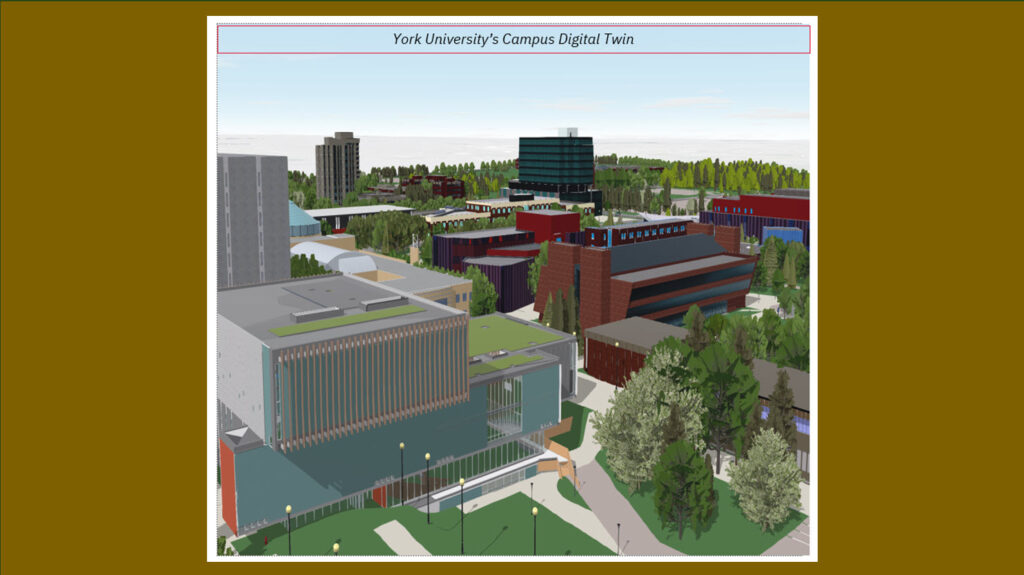
MOVE
Exploring the Future of Urban Spaces: The Keele Campus Digital Twin Demonstration
Discover the Keele Campus Digital Twin at our Virtual Reality Open House, showcasing a precise 3D reconstruction of York University's sprawling grounds. This advanced digital model captures around 90 buildings, 5,000 trees, and all elements of street furniture and road infrastructure, serving as an innovative tool for urban planning, indoor navigation, and pedestrian flow analysis. During the demo, attendees will see how the Digital Twin aids in designing seamless interactions between pedestrians and future mobility solutions like sidewalk delivery robots, autonomous vehicles/trains and wheelchairs. Explore how this virtual platform can transform urban development, enhancing efficiency and accessibility in real-world scenarios.
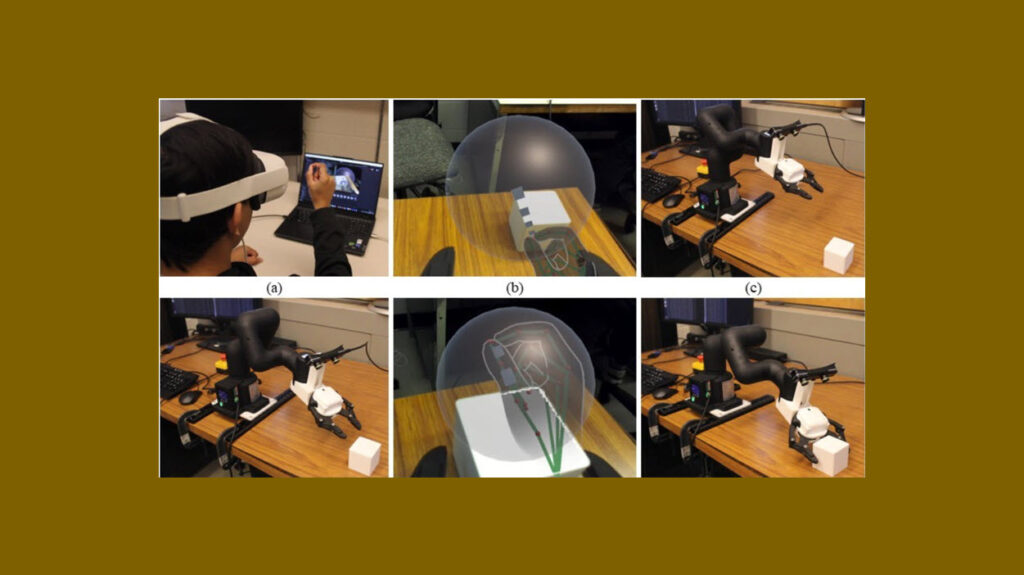
GeoVA Lab
The GeoVA lab has been focused on leveraging VR technology for engineering education and training in the field of drone technologies. We have developed a VR environment that enables users to learn complex drone mechanics concepts as well as train operators to fly drones, through the design of a real-time PID simulated drone. Our lab is also working towards combining mixed reality (MR), stereo vision, and hand tracking technologies to develop a human-robot interaction (HRI) interface that extends the ability to deploy robotic manipulators into the AEC sector quicker towards performing hazardous and complex manipulation tasks.
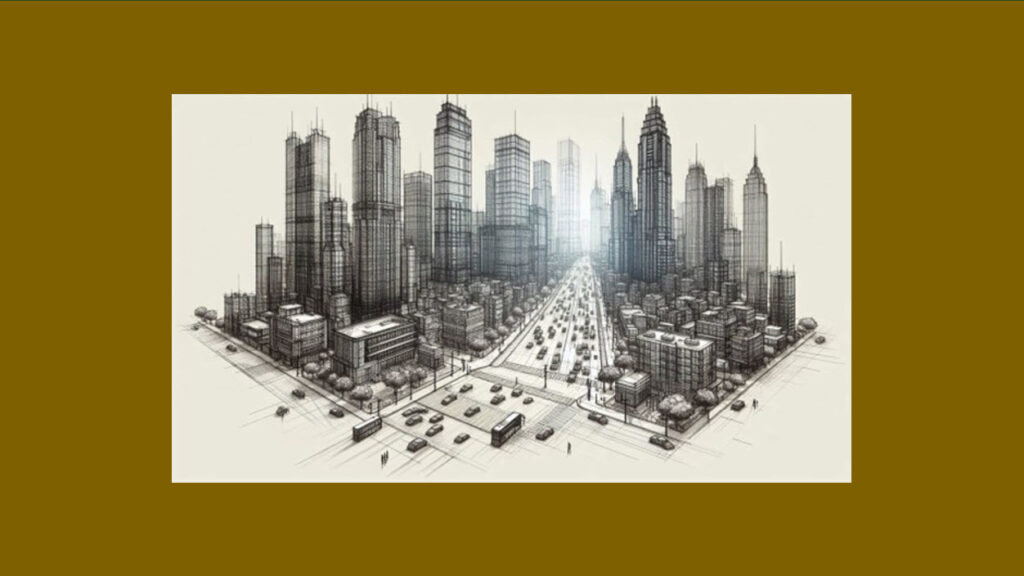
TO3D Canada
Aerial Reality Capture plays a crucial role in Digital Twin services by providing accurate and detailed 3D visualizations of existing structures and environments. Techniques such as "laser scanning", "aerial photogrammetry", and "LiDAR" are used to create highly precise models. These reality capture methods reduce uncertainty, enhance decision-making, and minimize costly errors throughout the project lifecycle. Combining 3D GIS models with reality captured data allows organizations to create true digital twins that represent the real world in a virtual environment. Aerial Reality Capture is essential for building and maintaining accurate Digital Twins, enabling efficient facility management and informed decision-making.
Event Poster
